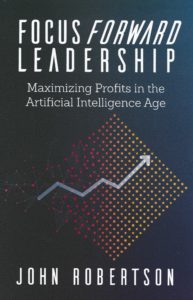Leadership Disruption
Forbes.com calls him
“Americas Business Futurist”
John Robertson: How to Overcome the Emerging Technology Tsunami

AUSTIN, Texas, April 11, 2019 /PRNewswire/ — If you think the world is data-driven now, you have not seen anything yet. The coming artificial intelligence tsunami will visit wave after wave of technological change upon us, much like the waves in an ocean. This tsunami of data-driven machine thinking will change every facet of our lives in the next few years, predicts one business leadership expert.
Robertson, the author of the book “Focus Forward Leadership: Maximizing Profits For The Artificial Intelligence Age” (2019, Indie Books International), believes C-level executives are not prepared to maximize ROI for the wild digital days on the horizon.
Andy Bynum
Executive Partner Forrester Research
“Focus Forward Leadership is a book based on experience and the understanding that success is about trusting those who know where they are going. It combines the proven practices of the military with the practical realities of today’s business environment. It needs to be on every business leaders bookshelf.”
“Innovation is a must as a company moves into the artificial intelligence age,” says Robertson. “Changes will occur too fast to rely on just one position or one team to provide new ideas. Both leaders and employees must each accept the responsibility to be transparent and effectively engage with one another to meet this challenge.”
Robertson offers three ways for executives to be agile to handle the challenges of the accelerating artificial intelligence age. He terms this the 4/12/365 Process.
“The 4/12/365 process focuses on a consistent, yet highly responsive way of doing business on a quarterly, monthly and daily basis,” says Robertson. “It is about what focus-forward leaders do in the process of making things better than it was before they got there. It requires four quarterly summits, 12 monthly meetings, and 365 daily actions that focus on the future. As always, the primary goal is to maximize profits.”
Here is the process breakdown:
Four. Everything the focus-forward company does should be focused into four quarterly summits. These summits should be held off-site for the CEO and the top executives. Such summits require trust, openness, and a team dedicated to the outcome they want to accomplish. The focus should be to concentrate only on the way forward.
“Quarterly summits provide a time to improve productivity, communication, cooperation, and awareness,” says Robertson. “They are a time to assess the efficient and effective use of leadership talent. They are a time of reassessing metrics, reconfirming quarterly priorities, and resolving unsettled issues.”
Twelve. Monthly meetings are designed to assure that the leadership team and their staffs have not lost sight of what it is that the company wants to accomplish over the quarter and the year. They are a “How goes it?” that looks at quick reference points for how well things are going.
“The twelve monthly meetings are where new tools and data requirements are identified and/or evaluated,” says Robertson. “This awareness is essential to develop and adjust to artificial Intelligence that will maximize profits and move the company beyond the destructive reach of the coming tsunami.”
Three-sixty-five. Daily actions are the enthusiasm that discovers new ideas and ways of doing things to maximize profits for the artificial intelligence age. They provide the means to create strong momentum, leading to strong monthly meetings, which establish well executed quarters, positioning the company for another profit-maximizing year.
“To survive the artificial intelligence tsunami, companies must provide more organizational structure around priorities and long-term results,” says Robertson. “Perhaps a football analogy would be helpful. Football requires both players on the field and coaches to direct the game plan. When coaches see things from the fans’ strategic position, rather than close-up and personal form the sidelines, they adjust the game tactics without changing the strategic game plan.”
“To survive the artificial intelligence tsunami, companies must provide more organizational structure around priorities and long-term results,” says Robertson. “Perhaps a football analogy would be helpful. Football requires both players on the field and coaches to direct the game plan. When coaches see things from the fans’ strategic position, rather than close-up and personal form the sidelines, they adjust the game tactics without changing the strategic game plan.”
“Innovation can bring abundance and profits, or expense and failure,” says Robertson. “More importantly, innovation is not just a CEO or top management task, it is an everyone task. Leaders must be open to someone else in the company having a better idea.”
About Indie Books International
Indie Books International (www.indiebooksintl.com) was founded in 2014 in Oceanside, California by two best-selling business authors. Since then the company has released more than 100 titles. Similar to indie film companies and indie music labels, the mission of Indie Books International is to serve as an independent publishing alternative to help business thought leaders create impact and influence.
Media Contact:
Henry DeVries, henry@indiebooksintl.com
619-540-3031
